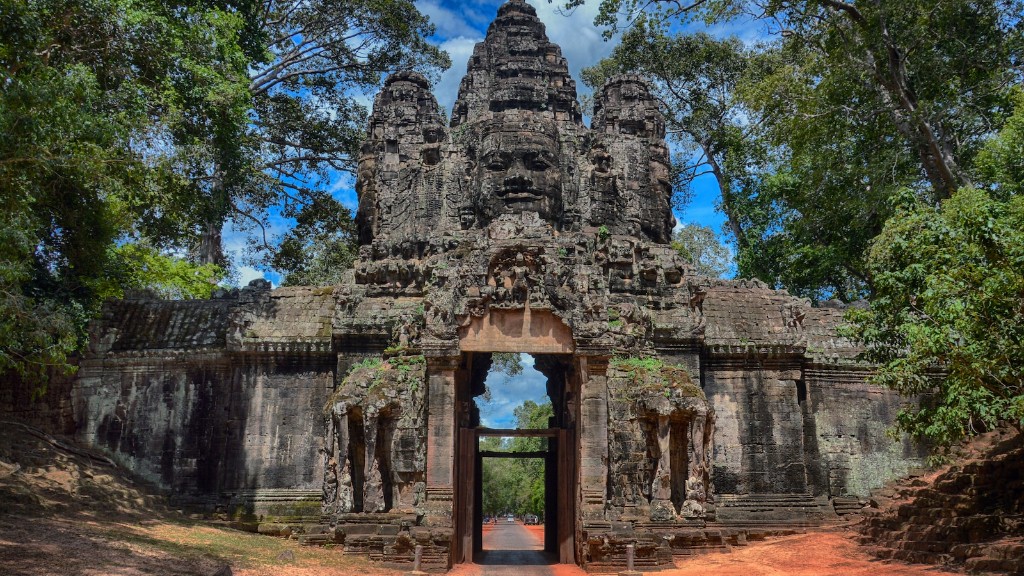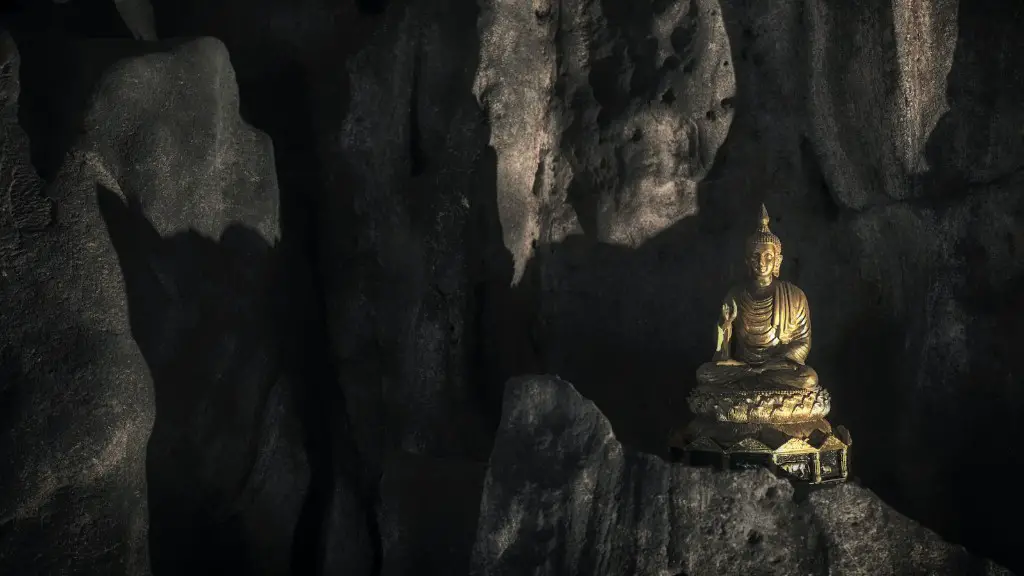The Holy Land of Christianity is the region of the Middle East where Jesus was born, raised, and lived his life as an influential religious teacher. The Bible refers to the land as the “Holy Land” because it was the center for Hebrew Prophecy and the birthplace of Christianity. Throughout history, the Holy Land has been home to many religions, including Judaism and Islam. Today, it is a hotly contested land between Palestine and Israel, with each nation claiming it as its own. But, what makes the Holy Land so holy and important to those who practice Christianity?
At the heart of Christianity is the belief in Jesus Christ as the son of God. Christians believe that Jesus, who was born in Bethlehem, was a Jewish teacher whose life was devoted to teaching and performing miracles. When he died, he rose from the dead and ascended into heaven, taking his place at the right hand of God with whom he was evermore. The holy land is the place where these events, known as the Passion of Christ, took place and is significant for this reason.
The holy land is associated with the life of Jesus for another reason – his ministry. The gospels portray Jesus as having roamed the length and breadth of the Holy Land, teaching about the Kingdom of God. The land of Israel is said to be the location of his many miracles, and where he healed the sick. He also journeyed to Mount Tabor, where the transfiguration took place, and to Jerusalem, where his final days were spent.
Aside from the physical locations associated with Jesus, the holy land has a spiritual significance. Christians believe that God has divinely ordained the land as sacred, and has blessed it with special powers and divine favor. In Christianity, the uplifting of the Holy Land is referred to as the “gathering of the redeemed”. This refers to the belief that all of the faithful will be gathered in the Holy Land at the end of time, when their faith and dedication to Jesus will be rewarded.
Politics Of The Holy Land
The politics surrounding the Holy Land have been fiercely contested throughout history. The land was originally ruled by the Ottoman Empire, and then passed to the British Mandate of Palestine in 1920. In 1947, the United Nations authorized a partition plan, which resulted in the creation of the State of Israel in 1948. This situation led to a series of wars, culminating in the occupation of the West Bank and the Gaza Strip by Israel in 1967, which they still hold.
The fact that the Holy Land is now a semi-autonomous region within the State of Israel has made it a great source of anxiety for many people in the region. Palestinians in particular have long argued that Israel has conducted an illegal and unjust occupation of their land. They argue that it is not only illegal under international law but that it goes against many of the basic tenets of Christianity. This has caused tensions between the two sides to continue to this day.
There is also great political debate over the ownership of Jerusalem, which is the holiest site for both Christians and Jews. For centuries, Jerusalem was governed by a variety of rulers, before the unification of Israel in the 20th century. Since then, Israel has asserted its claim on the city, leading to regular hostilities between Israelis and Palestinians.
Religious Significance Of The Holy Land
Religiously speaking, the Holy Land is of great significance to Christianity. It is where Jesus was born and lived, and the place where he performed many miracles and preached to the people. It is also where he was crucified and then rose from the dead. For these reasons, churches and religious sites in the Holy Land are regarded as particularly holy and revered by Christians.
In addition to being significant for the life of Jesus, the Holy Land is also significant for its religious symbolism. It has been a spiritual crossroads for various religions for centuries, and its hallowed grounds are important to Buddhists, Hindus, Muslims and Jews, as well as Christians. This has given it a special character and highlighted its importance for those of all faiths.
The Holy Land is additionally significant for its spiritual potency and its associated legends. For centuries, the region has been associated with spirituality, healing, and miracles. In the Bible, Jerusalem is depicted as the gateway to heaven and to the presence of God. Today, pilgrims travel to the Holy Land to visit sacred sites, to pray, and to be inspired by its spiritual power.
Tourism in The Holy Land
The Holy Land has long been a site of pilgrimage for Christians and other faiths. Many of the holy sites, in particular those associated with Jesus, are popular tourist destinations, drawing visitors from all over the world. Pilgrims come to the region to pray, to learn more about their faith, and to experience the sights, sounds and smells of a truly unique place.
Tourism to the Holy Land, however, is not without risks. The region remains politically volatile and tourists must adhere to strict security regulations in order to remain safe. In addition, visitors must be aware of the numerous religious, cultural and historical sites in the area and respect the sensitivities of the people who live there. Nevertheless, the region remains an important pilgrimage site for those of all beliefs.
The Holy Land is also home to many religious sites, festivals and fairs. The most popular of these are the Easter and Christmas festivals, which commemorate the death and resurrection of Jesus, respectively. There are also numerous other festivals, including the Sukkot harvest festival, the Passover pilgrimage, and the Feast of the Tabernacle. These all draw countless visitors each year and serve as an important reminder of the richness of the region’s faith.
Religious Tensions In The Holy Land
The Holy Land has been at the heart of religious tensions and conflicts for centuries. This can be attributed to the fact that the land is holy to all the Abrahamic faiths – Judaism, Christianity and Islam. As the birthplace of Jesus, the land is a source of profound spiritual significance for Christians and has become a site of spiritual contestation between religious sects and denominations. In this context, tensions between different faiths remain high.
For instance, the Israeli-Palestinian conflict is a particularly contentious issue and one that has been heavily influenced by religion. Israel’s claim on the land has long been a source of conflict with Arab nations and Palestinians who argue that the occupation has trampled on their rights to the land. This has caused widespread violence, disruption and suffering in the Holy Land, resulting in innumerable casualties on both sides.
In addition, some Christian denominations and sects adhere to more extreme forms of their faith, leading to clashes between different religious perspectives. This can be particularly evident in the Old City of Jerusalem, where the religious landscape is both diverse and complex. Here, Jewish, Christian and Muslim sects abound and jostle for spiritual significance, often leading to heated disagreements and religious tensions.
Education and Awareness In The Holy Land
Education and awareness are key for creating peace and understanding in the Holy Land. Local initiatives, such as the Jerusalem Intercultural Center, are working to unite different faiths and to promote dialog through seminars, lectures and debates. The center also runs an interfaith school where children of different religions come together to learn and to play. This brings an important sense of unity and harmony to the region, which is essential for sustained peace and stability.
Moreover, Jewish, Muslim, and Christian organizations in the Holy Land are using education to raise awareness of their respective faiths. This includes educating each other on the other’s traditions, allowing different faiths to appreciate each other’s beliefs and to gain a greater understanding of each other. Education is also being used in the region to promote peace and tolerance, so that the holy land can be a place of unity and respect.
In addition, initiatives are being launched to preserve the rich cultural heritage of the Holy Land. This involves protecting and restoring the numerous religious and historical sites. In recent years, many new heritage sites, such as the Western Wall, have been added to the list of UNESCO World Heritage Sites, and this is helping to ensure the protection and preservation of these sacred sites.
Conclusion
The Holy Land has great spiritual significance for those of the Christian faith. It is the land where Jesus performed his miracles and preached the Word of God, and is associated with many of the important events of his life. It is also a place of great religious symbolism, myth, and it is where peace and tolerance between different faiths is essential. The ongoing political and religious tensions in the region, as well as its spiritual significance, make the Holy Land an important place to visit and learn more about.


